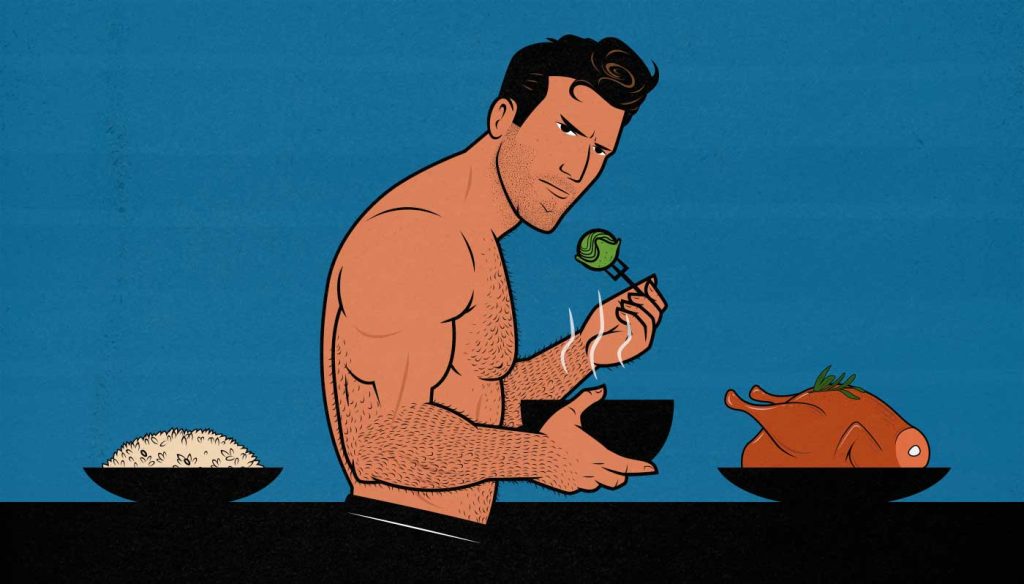
Bulking Diet Plan: How to Eat for Muscle Growth
This bulking diet guide covers everything you need to know about eating for muscle growth. This is how bodybuilders have traditionally bulked up, how athletes gain lean mass, and what modern science shows is the most effective way to fuel muscle growth.
Cassandra used this diet to gain over twenty pounds, I’ve used it to gain over sixty pounds, and Marco used it to gain over seventy. We also use it to help our clients bulk up, both in person and online. Those clients range from desk workers to college, professional, and Olympic athletes.
There are five parts to this guide:
- How much do you need to eat?
- What if you stop gaining weight?
- How much protein, carbs, and fat you should eat?
- What does a healthy bulking diet look like?
- What foods and meals should you eat?
Don’t expect to be shocked or thrilled. There’s nothing controversial here. These are well-known and well-studied principles with decades of tradition behind them. That’s by far the best way to get reliable results.
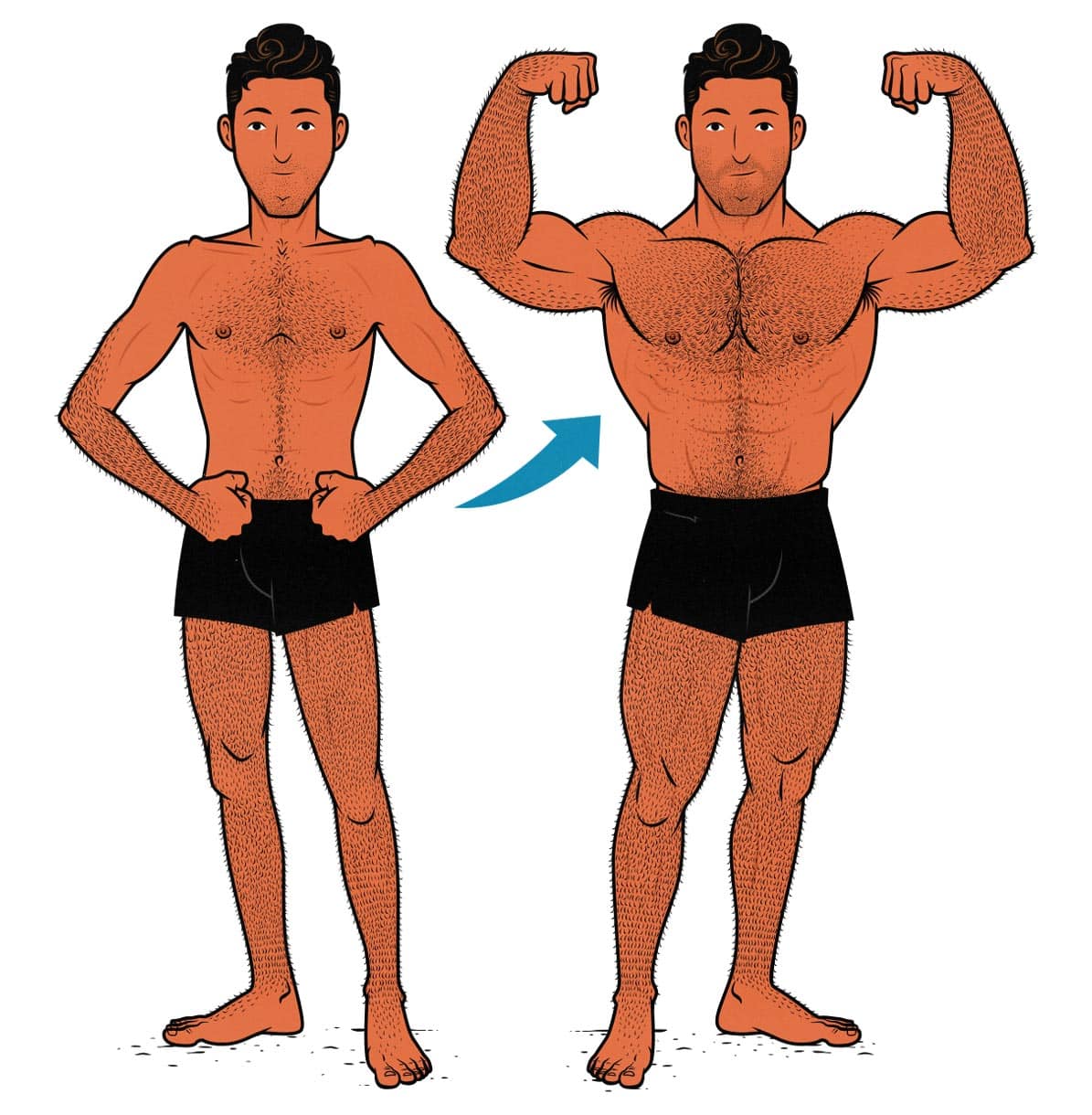
The Traditional Bulking Diet
The latest fad diet is exciting because its limits haven’t been found yet. Maybe you’ll build muscle leanly and incredibly quickly. Perhaps you’ll get better results than anyone has ever seen before.
Then, more people try the diet, it gets studied, and we find the limits. Almost always, the diet winds up being slightly less effective than the traditional approach, and it gets washed away by the waves of time. For example, intermittent fasting and ketogenic diets aren’t quite as good as traditional bulking diets.
This article is about the traditional bulking diet:
- It’s a diet rooted in the bodybuilding tradition. The most effective methods are often those that have stood the test of time. That isn’t always true, but it’s a good place to start.
- It’s nearly identical to what top athletes eat, giving us a whole other tradition and line of research to draw from. After all, most athletes benefit from being bigger, stronger, and more muscular.
- It’s based on research conducted over several decades, with each new study building upon the overall body of evidence. We’ve kept up with all the latest research, tweaking the diet as needed.
- It’s what we personally used to gain over sixty pounds each. We then tested it on thousands of clients, both in person and online, ranging from desk workers to Olympic athletes.
Muscle-building diets have improved gradually over the years. All of those improvements were brand new at some point. However, these tend to be incremental improvements. A small tweak yields an improvement that’s barely noticeable. Yet, when enough of those small improvements coalesce, you get a diet that’s significantly better for building muscle.
I’m sure we’ve missed some effective methods, but it pays to be patient. For every gem, there are ten pieces of glimmering glass. It’s wiser to wait until the evidence grows strong enough.
As the research currently stands, as of 2024, this should be the best bulking diet.
The Calorie Surplus
How Quickly Should You Gain Weight?
The most important part of any bulking diet is the calorie surplus. Not everyone needs to get into a surplus to build muscle, but most skinny people, lean people, and intermediate lifters do. That’s who this article is for.
But how big should your calorie surplus be? We have a full article digging into the research, but as a rule of thumb, gaining around a pound per week should allow you to build muscle fairly fast while keeping your gains quite lean (systematic review).
Skinny beginners are often able to build muscle faster. If that’s you, you might be able to gain 1–2 pounds per week without gaining much fat. I gained 20 pounds during my first three months of bulking (1.6 pounds per week). My roommate gained over 2 pounds per week. We see numbers like that all the time with people doing our bulking program:
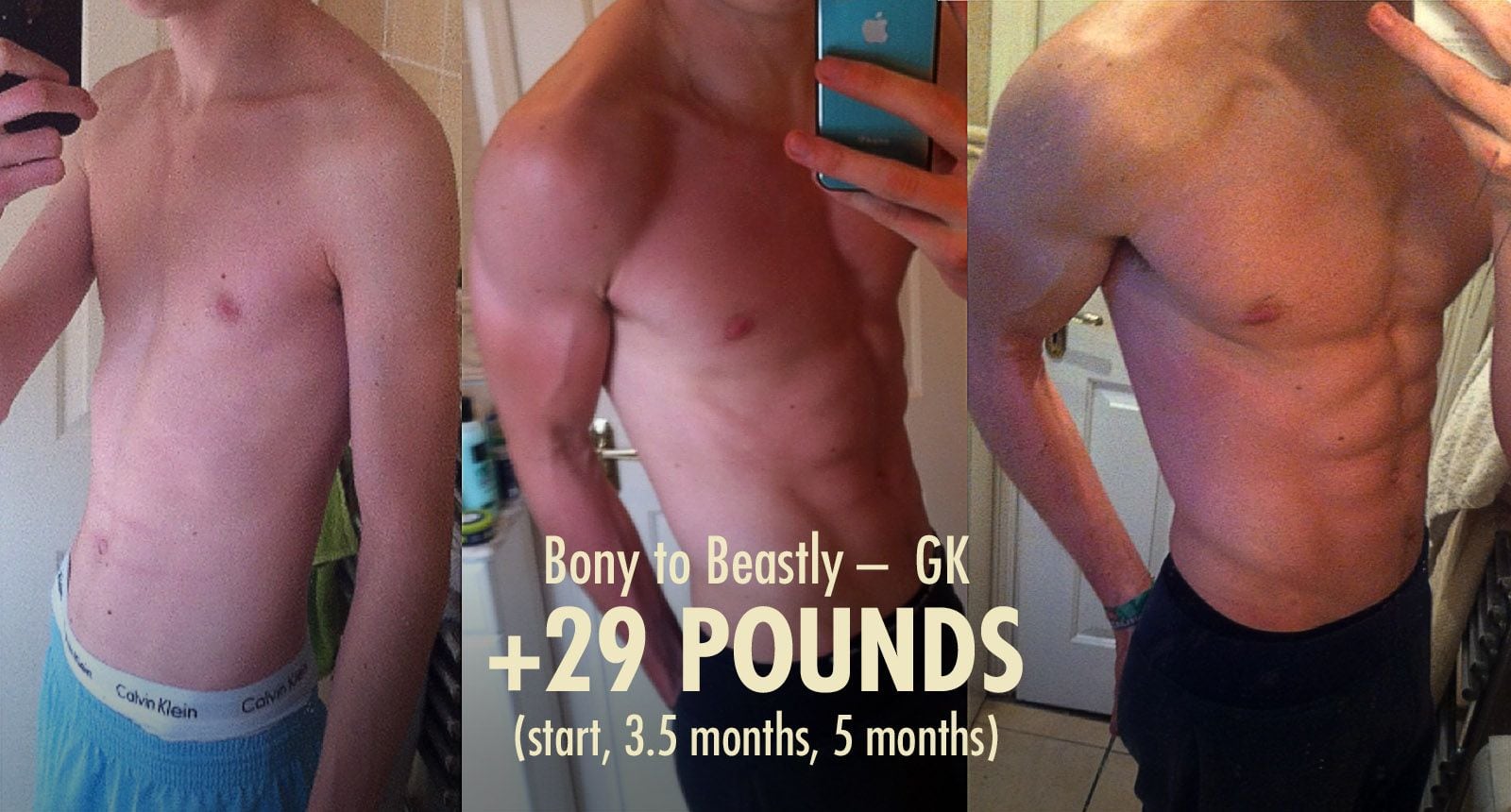
As you build more muscle, you’ll get closer to your genetic potential, and your rate of muscle growth will slow. So for intermediate lifters who have already gained their first 20 pounds, a better rule of thumb is to gain 0.5–1 pound per week:
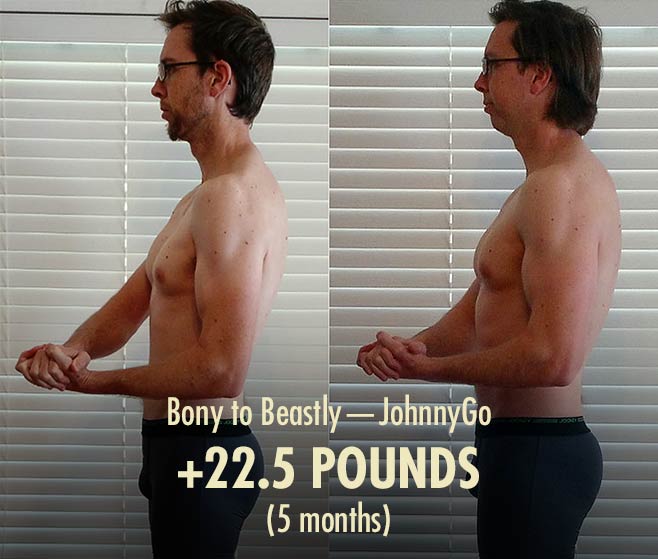
Some research shows that even advanced bodybuilders can build muscle faster by gaining weight faster, but that extra muscle usually comes with extra fat (study). So, if you’re at all afraid of gaining fat, it usually pays to take it slower.
Plus, for every study showing a benefit to gaining weight faster, there’s another showing it doesn’t help. We want the best of both worlds: fast muscle growth with minimal fat gain. Gaining 0.5–1 pound per week is usually the best way to do that.
How to Get Into a Calorie Surplus
There are three good ways to get into a calorie surplus:
- Add calories to a steady diet: Right now, you’re probably eating enough to maintain a stable body weight. All you need to do is add 250–500 calories on top of that. That could be as simple as having a smoothie between breakfast and lunch. This works best if you already eat a healthy diet on a consistent schedule.
- Follow a meal plan: I used this approach during my first bulk. You estimate how many calories you need using a bulking calorie calculator, then follow a meal plan like this one. In our program, we have a recipe book full of classic bulking recipes. You choose the ones you want and add them together. That way, you get more control over your diet. This works best if your diet needs a lot of work.
- Track your calories: The easiest way to do that is to use a calorie-tracking app. We’re affiliated with MacroFactor. We think it’s by far the best calorie-tracking app out there, especially for bulking. We have a full review here. If you want to try it, you can get an extended free trial with the code “b2b”. This works especially well for lean bulks.
Whichever method you choose, the magic happens when you start making adjustments based on how quickly you’re gaining weight. The sooner you start eating more food and weighing yourself, the sooner you can refine your diet until it’s working perfectly.
How to Adjust Your Calorie Intake
Whatever method you choose, adjust your calories based on how much weight you gain each week. For example, if you weigh 150 pounds, you might start by eating 3,000 calories per day. That’s a good place to start, but your metabolism might be faster than average, and you might not gain weight. That doesn’t mean you’re doomed to stay skinny forever; it just means you need to add more calories.
If you’re not gaining weight, add 200 calories. If you’re gaining weight too fast, remove 100 calories. This can be as simple as increasing your serving sizes, eating a handful of trail mix, or having a banana with a glass of milk. If you’re tracking your calories with Macrofactor, it will adjust your recommendations automatically.
There’s a bit of nuance here, though. Your weight fluctuates. You can easily gain a few pounds between breakfast and dinner as your digestive system fills up with food. So, you need to track your weight properly:
- The first week is a wildcard. When you first start bulking, you’re adding extra food to your digestive system, inflating your muscles full of glycogen, and adjusting to a new sodium intake. Thus, it’s common to gain 2–3 pounds of “bulking weight” that will disappear as soon as you stop bulking. And that’s great. There’s no need to eat fewer calories. Hold steady.
- Always weigh yourself at the same time of day. For example, weigh yourself first thing every Sunday morning before breakfast. Even better if your dinner the night before is fairly consistent from week to week.
- Don’t expect a perfectly steady pace. If you’re trying to gain a pound per week, anywhere from 0.5–1.5 pounds is good. Those small discrepancies are well within the realm of natural fluctuations. Wait a couple of weeks before making any adjustments.
- Your weight gain will slow with time. A pound of muscle burns around 10 calories per day, so if you gain 10 pounds, that’s another 100 calories per day. A pound of fat burns slightly fewer calories than that. Plus, your metabolism might adapt to your higher calorie intake. That’s especially common with naturally skinny “hardgainers.”
The Best Bulking Macros
You don’t need to track your macros, but it helps to know what they are and what you’re aiming for. If already eat a healthy diet, your macros are probably okay, but you might need some extra protein while bulking. If you’re using our recipes, we’ve already optimized the macros for you. And if you’re using Macrofactor, it will give you targets to aim for.
What are Macronutrients?
Food contains nutrients. The nutrients that contain energy are called macronutrients (protein, carbs, fat, and fibre) and the ones that don’t are called micronutrients (vitamins, minerals, probiotics, phytonutrients, etc). You need both of them to be healthy, but it’s the macronutrients that help you gain weight.
- Protein contains 4 calories per gram and breaks down into amino acids, which we use to build muscle. These are the stones with which we build our bodies into castles.
- Carbs contain 4 calories per gram, break down into glucose (a simple sugar), and are stored in our muscles as a fuel called glycogen. You don’t need to eat carbs, but they’re a great source of energy, often come packaged with fibre, and they make our muscles fuller and stronger. This is the grain in our storehouses we feed our peasants with, giving them the energy they need to toil under the hot sun, laying row after row of stones.
- Fat contains 9 calories per gram, breaks down into fatty acids, and is stored as body fat, which can be burned for energy. Fat is also the source of several fat-soluble vitamins, and we use it to help regulate our hormones, making it a vital part of our diets. It is the gold in our coffers that we use to bribe the corrupt officials who try to limit how many stories we can build.
How Much Protein Should You Eat?
A good rule of thumb is to aim for roughly 1 gram of protein per pound of body weight per day. So, if you weigh 150 pounds, aim for around 150 grams of protein per day.
That’s a rough goal, though. The latest research shows that eating as little as 0.7 grams/pound/day is enough to maximize your rate of muscle growth (study). At the other end of the spectrum, Jose Antonio has conducted several studies showing that eating tons of protein is fine but doesn’t speed up muscle growth (study, study, study).
Consuming 5.5 times the recommended daily allowance of protein has no effect on body composition in resistance-trained individuals
Jose Antonio, PhD
We recommend eating a balanced diet made up of balanced meals. That means every meal should have a source of protein in it. A good rule of thumb is to aim for at least 20 grams per meal, but some of your meals will likely need to have more.
The type of protein you eat doesn’t seem to matter. You might hear that some sources of protein are more complete or have more leucine, and that’s true, but these are only concerns for people eating very little protein. Bulking diets have an abundance of protein. You’ll get all the amino acids you need.
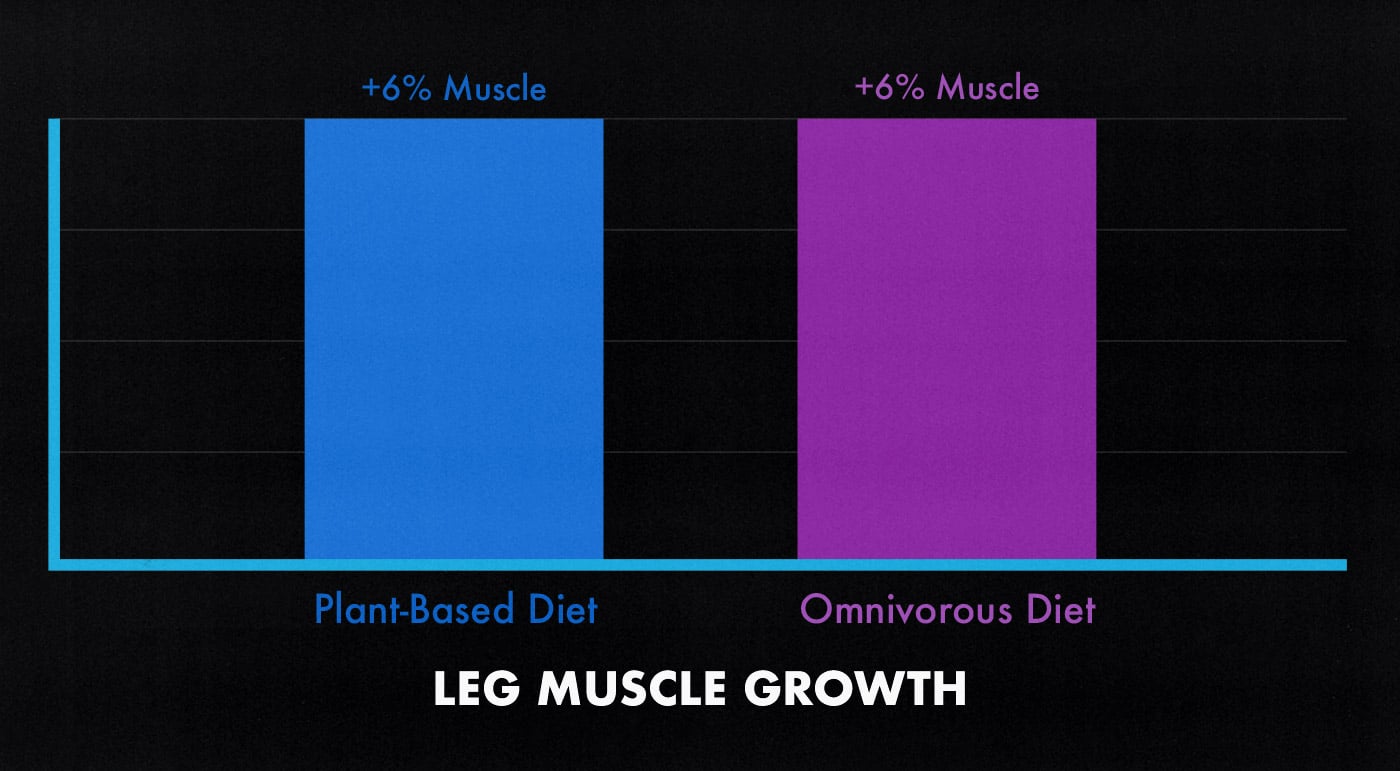
You can get your protein from meat, dairy, eggs, nuts, seeds, peas, whole grains, legumes, soy, and whatever else you can think of. You can even bulk on a fully vegan diet (study).
How Many Carbs Should You Eat?
Carbs are controversial, but they shouldn’t be, especially for building muscle. Most of the longest-living cultures eat diets that are over 50% carbs. Elite athletes usually get 50–60% of their calories from carbs. The typical bodybuilder eats a high-carb diet, too.
- Most research shows getting 40–60% of our calories from carbohydrates improves our workout performance, gives our muscles a fuller appearance, and increases our rate of muscle growth (study, study).
- The National Strength & Conditioning Association recommends getting 45–65% of our calories from carbohydrates. They note that this range is best for our general health, for building muscle, and for gaining strength.
- The Journal of the International Society of Sports Nutrition recommends eating enough protein to maximize muscle recovery and growth, enough fat for good hormonal health, and then to get the rest of our calories from carbohydrates. That typically works out to around 40–60% of calories coming from carbs.
Still, carbs are often blamed for the obesity epidemic, and there’s a grain of truth there. When researchers remove carbs from people’s diets, they often have a hard time eating enough calories to gain weight. For overweight people, that’s a desirable outcome. But for skinny guys trying to bulk up, it can make gaining weight almost impossible.
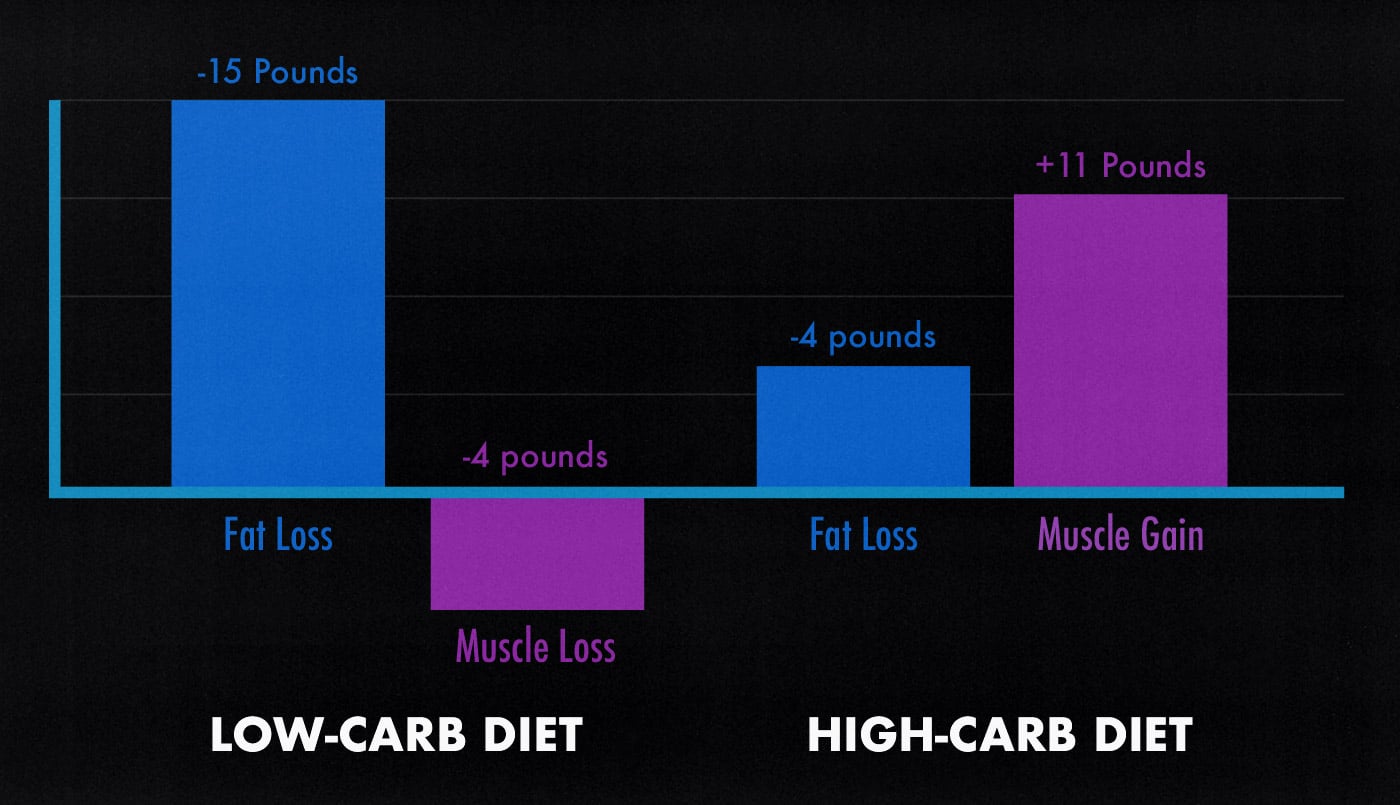
A 15-week study split bodybuilders into low-carb and high-carb groups (study). The low-carb group wasn’t able to eat enough calories to support muscle growth, so they lost a few pounds of muscle. The high-carb group managed to get into a good calorie surplus, gaining 11 pounds of muscle while losing fat.
If the low-carb group had managed to eat more calories, perhaps they would have built more muscle. It’s hard to say because every low-carb muscle-building study runs into the same limitation: the low-carb groups can’t eat enough calories to keep up.
As for where to get your carbs, think of fruits, veggies, potatoes, sweet potatoes, all types of rice, whole grains, peas, yogurt, and a little bit of honey.
How Much Fat Should You Eat?
You don’t need to worry about eating extra fat while bulking. You want at least 0.3 grams of fat per pound of body weight per day, but almost everyone already eats enough, and bulking doesn’t require any extra.
So, instead of trying to eat more fats, try to eat better fats, such as nuts, seeds, avocadoes, fatty fish, extra virgin olive oil, cheese, yogurt, kefir, eggs, and avocado oil.
How to Eat a Nutritious Bulking Diet
The Supposed Magic of Chili
I’ve gained over sixty pounds of muscle, and most of it’s made of chili. When I was first bulking up, I’d cook ten servings of chili every Sunday, eat one for dinner, and save the rest for later that week, eating it once or twice every day.
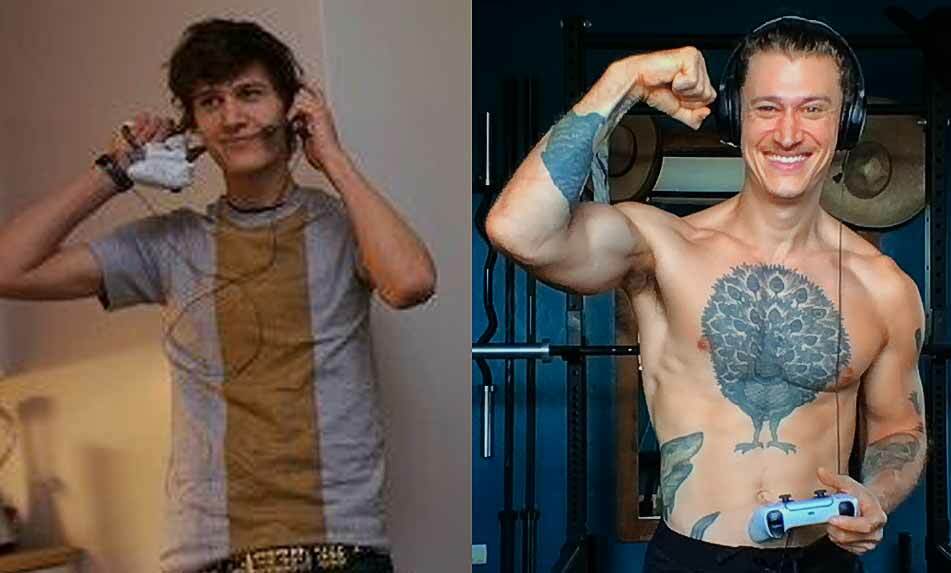
Around that time, my friend Payam noticed I was getting into good shape. He wanted to get stronger while losing weight. I gave him my chili recipe and told him to split it into more servings. He lost twenty pounds that month.
Another friend, Willem, noticed Payam’s weight loss and wanted to try my “chili diet.” Not to be outdone, he too lost 20 pounds in a month.
Shortly after that, my roommate Jared ate chili every day while bulking, gaining 27 pounds in four months:
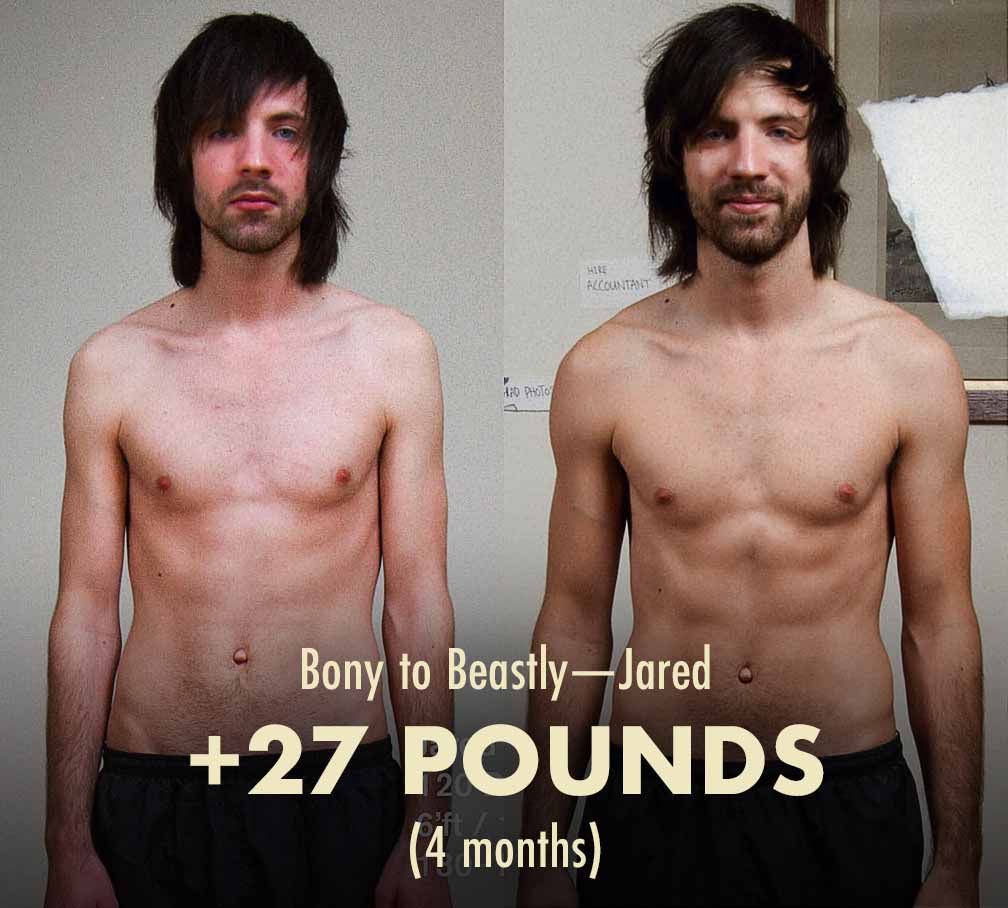
Years later, I was looking up the micronutrients in that chili recipe (which is a totally normal chili recipe I learned from my mum). It’s high in protein, rich in every single vitamin and mineral, and a great source of fibre, plugging every nutritional hole in our diets.
It might sound like I’m trying to sell you on chili, but I’m not. Our program includes a full recipe book, and my chili recipe is proudly featured, but most traditional meals are balanced and nutritious. I’m trying to sell you on the value of eating real food.
How to Choose Nutritious Foods
There’s a war raging on in the bodybuilding world, one side fighting for clean eating, the other for If It Fits Your Macros (IIFYM). And that’s just the bodybuilders. If you turn to the world of strength training, you’ll see a variety of other diets, ranging from keto to carnivore to outright dirty bulking.
These diets are waging serious wars against certain types of junk food, but you can do even better by more casually avoiding all the different types of junk food. You already know that donuts, soda, chips, deep-fried fast food, processed meat, and butter can be bad for you in excess. You don’t need to make demons of them, but you shouldn’t build your bulking diet around them, either.
Plenty of reasonable people recommend focusing on whole foods, and that’s a good heuristic, but it doesn’t survive much scrutiny. Yogurt is processed, but fermentation adds probiotics, making it even healthier than unprocessed milk. Whey is even more processed, but it’s rich in calcium, potassium, phosphorous, and B vitamins and has none of the saturated fat that troubles butter.
It’s Hard to Eat Enough to Gain Weight
You’d think that with how common it is to be overweight, eating a bulking diet would be easy. However, most people gain weight while living sedentary lifestyles and eating too much junk food. And even then, they gain weight slowly over many years.
- The less active someone is, the fewer calories they burn, making it easier to overeat. But if you’re bulking, you’re lifting weights, increasing your calorie needs. You’ll need to eat even more calories if you’re active or do cardio (which is great for you).
- Junk food is high in calories, digests quickly, and is incredibly palatable, making it easier to overeat. You could eat more junk food to make it easier to gain weight (known as dirty bulking), but you’d gain more fat and less muscle, and it wouldn’t be as good for your health.
- Gaining weight slowly is much easier. Most people gain a few pounds per year. That’s more than they want, but it wouldn’t make for a very impressive bulk. You’ll be gaining be gaining weight much faster than that.
So we have a problem. Most people have a hard time eating in a sustained calorie surplus, and people who are naturally thin struggle most of all. That’s why we made this site. All three of us had trouble gaining weight. We wanted to help other people going through those same struggles.
How to Eat More Calories More Easily
We need to get into a calorie surplus in a way that’s healthy and supports muscle growth. That means we need lots of carbs, a moderate amount of protein, and plenty of healthy fats. We need a balanced mix of vitamins, minerals, soluble and insoluble fibre, probiotics, and phytonutrients. And we need to keep our intake of refined sugar and saturated fat in check.
To start, we can look at the results of an old study that measured how filling different foods were (study):
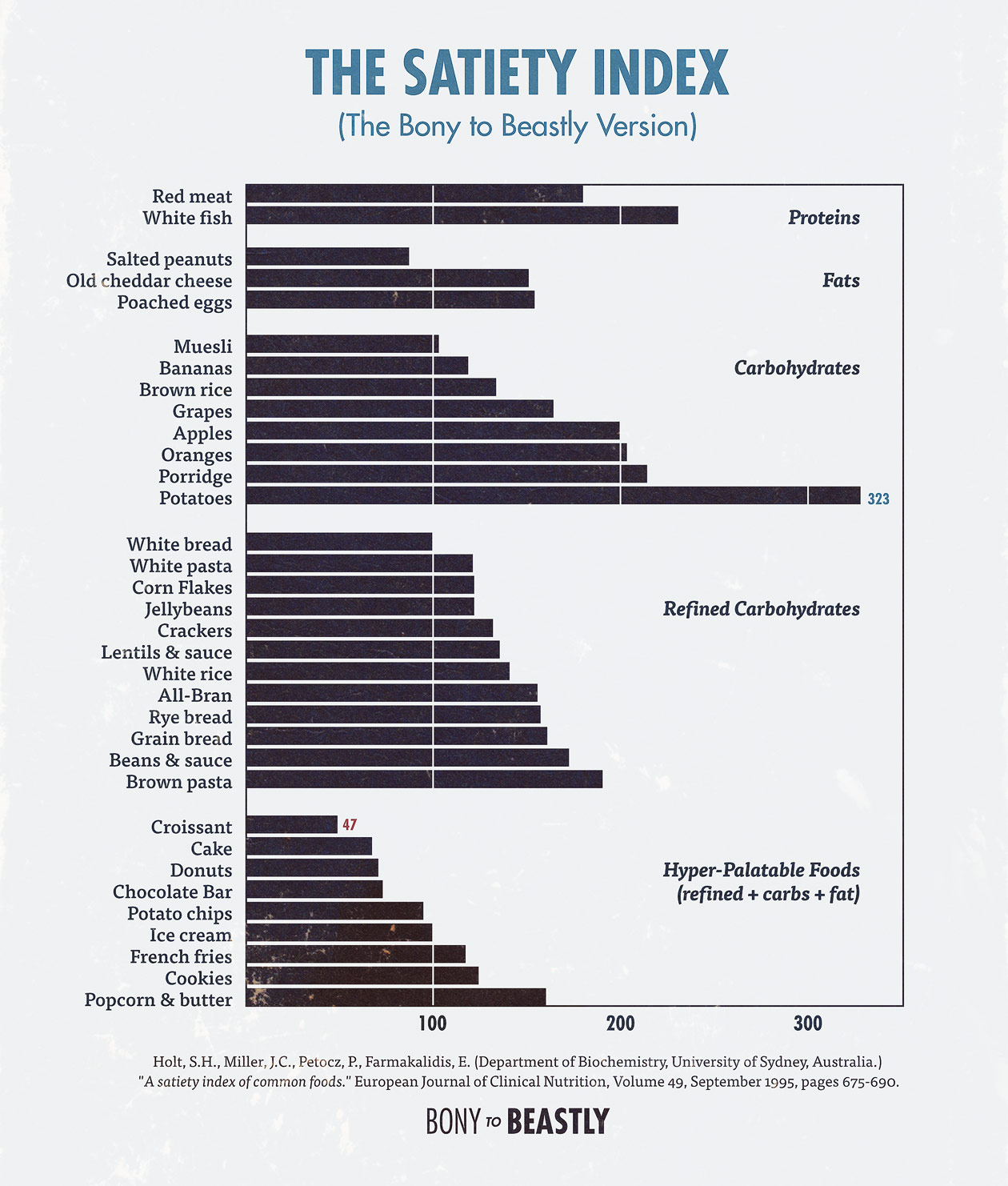
There was a 50-calorie difference for every 100 points on the satiety index. For example, someone who ate a croissant for lunch (47 satiety) would eat 150 more calories for dinner than someone who ate a boiled potato (323 satiety). Unfortunately, croissants aren’t particularly nutritious.
But look at peanuts, muesli, and brown rice. Those are exactly the sorts of foods we should eat more of. They’re rich in carbs, protein, healthy fats, vitamins, minerals, and fibre.
We can do even better. When you grind and blend food, we make it easier to chew and digest. We can eat extra-lean ground beef and chicken. We can blend fruits, veggies, nuts, and protein powder into high-calorie smoothies.
You can also eat more often. A common complaint while bulking is that the food crashes your energy levels. You can maintain steadier energy levels by eating balanced meals that are rich in fibre, but if your meals get too big, the sheer caloric load will weigh you down. Most people find it easier to sneak in snacks. Most research shows that snacking causes people to inadvertently eat more calories (study).
The Best Bulking Foods
To make bulking easier, we want to lean into foods that are nutritious, energy-dense, and easy to digest. We have a full article on how to eat more calories and another about the best bulking foods, but here’s a list of examples to get you started:
- Smoothies are the king of bulking drinks. Blend up some frozen berries, a banana, spinach, yogurt, oats, and a scoop of protein powder. Blending healthy foods doesn’t reduce their nutritional value. Best of all, you can prepare and chug it in under 5 minutes. And because it’s been blended, it will pass through your digestive system quite quickly.
- Bananas are rich in fibre, vitamins, and minerals, making them as nutritious as other fruits. However, they’re higher in calories and easier to eat.
- Nuts (and nut butter) are another great source of easy calories. A tablespoon of peanut butter has 100 calories and four grams of protein. Peanut-butter and banana sandwiches are one of the simplest bulking meals.
- Dried fruits pack the same nutritional punch as regular fruits, but because they contain so much less water, they’re much smaller, taking up much less space in your stomach.
- Trail mix has over 500 calories per cup. That means you can shift into a bulk by adding a single cup of trail mix to your diet. My favourite type of trail mix is a mix of peanuts, pumpkin seeds, soybeans, almonds, and dried cherries. It has 40 grams of protein per cup.
- Milk and soy milk are easy sources of calories and protein. Both contain around nine grams of protein per cup. Both digest quickly.
- Muesli cereal is a cereal made from nuts, grains, and dried fruit. When combined with milk or soy milk, it becomes a fully balanced bulking meal.
- Extra-virgin olive oil is a nutritious source of fat. A tablespoon contains 120 calories, and you can easily drizzle that over your veggies or a bowl of chili. For a more dubious example, if I was short on calories at the end of the day, I’d make up the difference by taking olive oil shots (at 350 calories per shot).
- Rice is a great source of carbohydrates. Brown rice is richer in fibre, but white rice is easier to eat and digest. It was Marco’s main source of calories while gaining over seventy pounds.
- Oats aren’t quite as easy to digest as rice, but they contain more fibre and micronutrients. You can boost the protein by making your oatmeal with milk, soy milk, or protein powder.
- Cheese, yogurt, and kefir have all the calories and protein of dairy, and the fermentation process adds probiotics, improving digestive health.
- Eggs have 150 calories and 13 grams of protein, along with plenty of vitamins, minerals, and healthy fats. They pair well with fibrous foods like beans.
- Extra-lean ground beef and chicken are like regular meat, except they’re lower in saturated fat, easier to chew, and quicker to digest. They also have more connective tissues than cushier cuts of meat, making them higher in collagen and choline.
- Beans are one of my favourite bulking foods. They’re high in carbs, protein, and fibre, along with several different vitamins and minerals. Everything about them is perfect for building muscle.
- Salmon (and other fatty fish) are high in protein and omega-3s. Plus, the extra fat adds extra calories.
The Best Bulking Supplements
When you think of eating a good diet, you probably wouldn’t think of bodybuilding supplements like pre-workouts, energy drinks, and protein shakes. None of the ingredients are known to be harmful, though, and they can easily fit into a balanced diet.
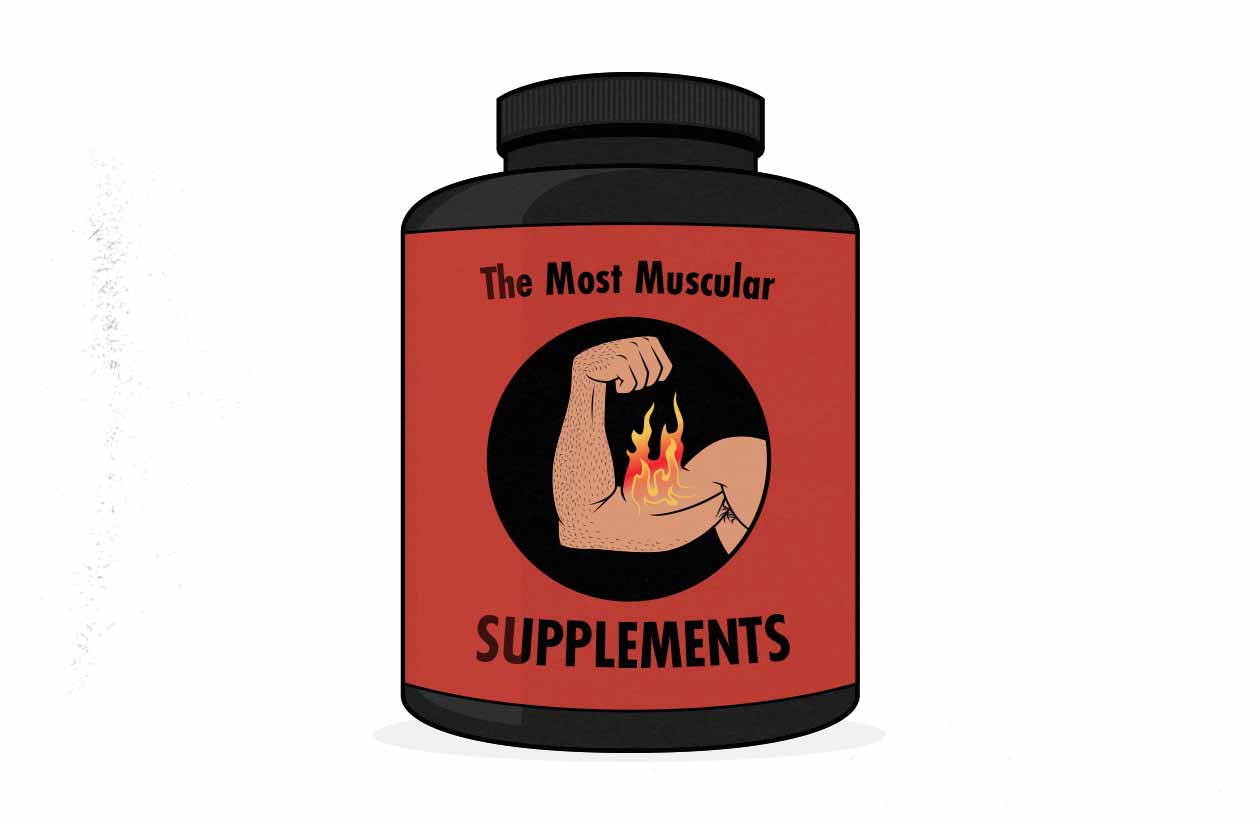
- Protein powder is an easy source of protein. It isn’t better or worse than other sources of protein, just more convenient. Whey protein and plant-based protein powders are similarly effective. You can have 1–3 scoops per day for several months at a time. A good place to start is having 1–2 scoops after every workout.
- Creatine is one of the few supplements that can help you build muscle faster. It’s cheap, healthy, effective, and has been thoroughly tested for many decades (study). It increases your rate of muscle growth by around 33% during your first few months of taking it. You can mix 5 grams into a tall glass of water once per day.
- Pre-workouts are caffeinated drinks that give you more energy to lift weights. They often contain some protein (amino acids), creatine (and beta-alanine), and vasodilators (like betaine, citrulline, and arginine). Those vasodilators slightly improve blood flow, giving you better performance and muscle pumps. You can have them a few times per week, especially if you train earlier in the day.
- Mass gainers are simple carbs (such as maltodextrin) mixed with protein powder (such as whey protein). They’re quick to prepare, the macros are good, and they tend to be fairly easy to digest. However, they aren’t very nutritious, so you should have them in moderation.
Free Bulking Recipes
get our bulking recipes—smoothies, snack, & protein balls
4 free bulking recipes
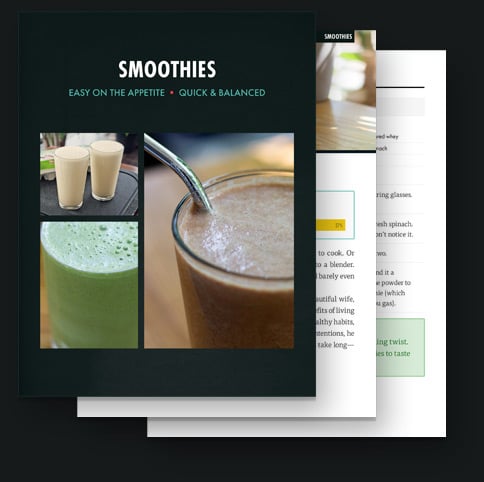
Get four bulking recipes in a downloadable PDF file. Get the full explanation, ingredient list, macros, and steps to follow.
Plus, we’ll make sure you’re on the b2B newsletter, and send you all of our best muscle-building content.
Summary
Here are the most important factors when building your bulking diet. If you combine this diet with a good bulking workout program, you’ll build muscle.
- Eat enough calories to gain weight. Gaining 0.5–1 pound per week is a good default. That means eating 250–500 extra calories per day. If a couple of weeks go by without gaining weight, add another 200 calories. If you’re gaining weight too quickly, remove 100.
- Eat enough protein to build muscle. Aiming for 1 gram of protein per pound of body weight per day makes for a good rule of thumb, but anything over 0.7 grams per pound should be enough to maximize your rate of muscle growth.
- Eat plenty of carbohydrates. Carbs make your muscles fuller, improve workout performance, and make it easier to get into a calorie surplus. A good default is to get 40–60% of your calories from carbohydrates.
- Choose healthy fats. Try to get your fats from foods like nuts, seeds, avocados, olive oil, fatty fish, and fermented dairy, along with a little dark chocolate.
- Get most of your calories from nutritious foods. Your diet doesn’t need to be perfectly “clean,” but you should save junk food for the occasional treat.
- Eat more often. Sneaking in snacks is usually easier than eating giant meals.

If you want us to walk you through the entire bulking process, check out our Bony to Beastly (men’s) program or Bony to Bombshell (women’s) program. They include a 5-month customizable workout routine, a bulking diet plan, a recipe book, a lifestyle guide, and coaching from us in our online community.


